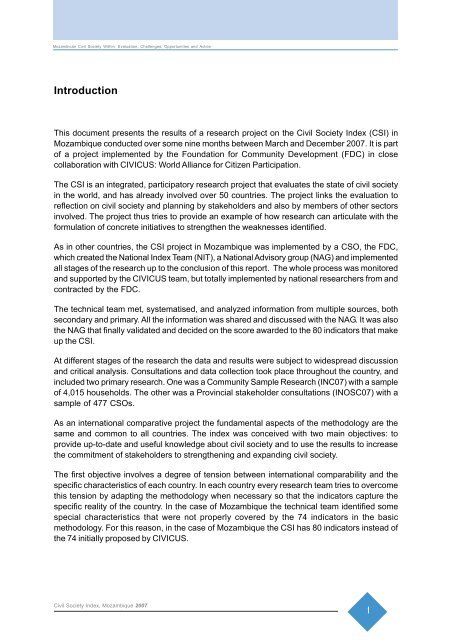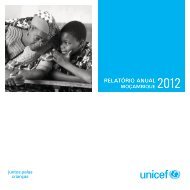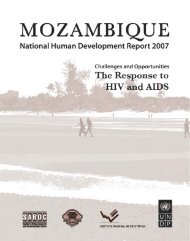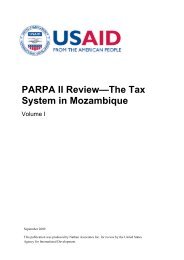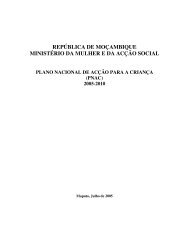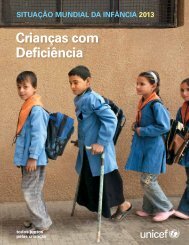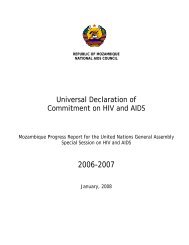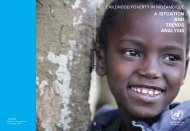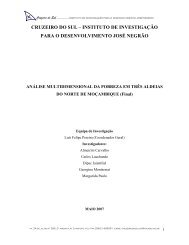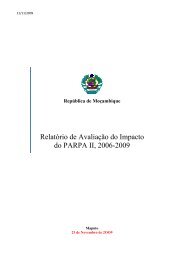Mozambican Civil Society Within: - UNICEF Mozambique - Home page
Mozambican Civil Society Within: - UNICEF Mozambique - Home page
Mozambican Civil Society Within: - UNICEF Mozambique - Home page
You also want an ePaper? Increase the reach of your titles
YUMPU automatically turns print PDFs into web optimized ePapers that Google loves.
<strong>Mozambican</strong> <strong>Civil</strong> <strong>Society</strong> <strong>Within</strong>: Evaluation, Challenges, Opportunities and Action<br />
Introduction<br />
This document presents the results of a research project on the <strong>Civil</strong> <strong>Society</strong> Index (CSI) in<br />
<strong>Mozambique</strong> conducted over some nine months between March and December 2007. It is part<br />
of a project implemented by the Foundation for Community Development (FDC) in close<br />
collaboration with CIVICUS: World Alliance for Citizen Participation.<br />
The CSI is an integrated, participatory research project that evaluates the state of civil society<br />
in the world, and has already involved over 50 countries. The project links the evaluation to<br />
reflection on civil society and planning by stakeholders and also by members of other sectors<br />
involved. The project thus tries to provide an example of how research can articulate with the<br />
formulation of concrete initiatives to strengthen the weaknesses identified.<br />
As in other countries, the CSI project in <strong>Mozambique</strong> was implemented by a CSO, the FDC,<br />
which created the National Index Team (NIT), a National Advisory group (NAG) and implemented<br />
all stages of the research up to the conclusion of this report. The whole process was monitored<br />
and supported by the CIVICUS team, but totally implemented by national researchers from and<br />
contracted by the FDC.<br />
The technical team met, systematised, and analyzed information from multiple sources, both<br />
secondary and primary. All the information was shared and discussed with the NAG. It was also<br />
the NAG that finally validated and decided on the score awarded to the 80 indicators that make<br />
up the CSI.<br />
At different stages of the research the data and results were subject to widespread discussion<br />
and critical analysis. Consultations and data collection took place throughout the country, and<br />
included two primary research. One was a Community Sample Research (INC07) with a sample<br />
of 4,015 households. The other was a Provincial stakeholder consultations (INOSC07) with a<br />
sample of 477 CSOs.<br />
As an international comparative project the fundamental aspects of the methodology are the<br />
same and common to all countries. The index was conceived with two main objectives: to<br />
provide up-to-date and useful knowledge about civil society and to use the results to increase<br />
the commitment of stakeholders to strengthening and expanding civil society.<br />
The first objective involves a degree of tension between international comparability and the<br />
specific characteristics of each country. In each country every research team tries to overcome<br />
this tension by adapting the methodology when necessary so that the indicators capture the<br />
specific reality of the country. In the case of <strong>Mozambique</strong> the technical team identified some<br />
special characteristics that were not properly covered by the 74 indicators in the basic<br />
methodology. For this reason, in the case of <strong>Mozambique</strong> the CSI has 80 indicators instead of<br />
the 74 initially proposed by CIVICUS.<br />
<strong>Civil</strong> <strong>Society</strong> Index, <strong>Mozambique</strong> 2007<br />
1


